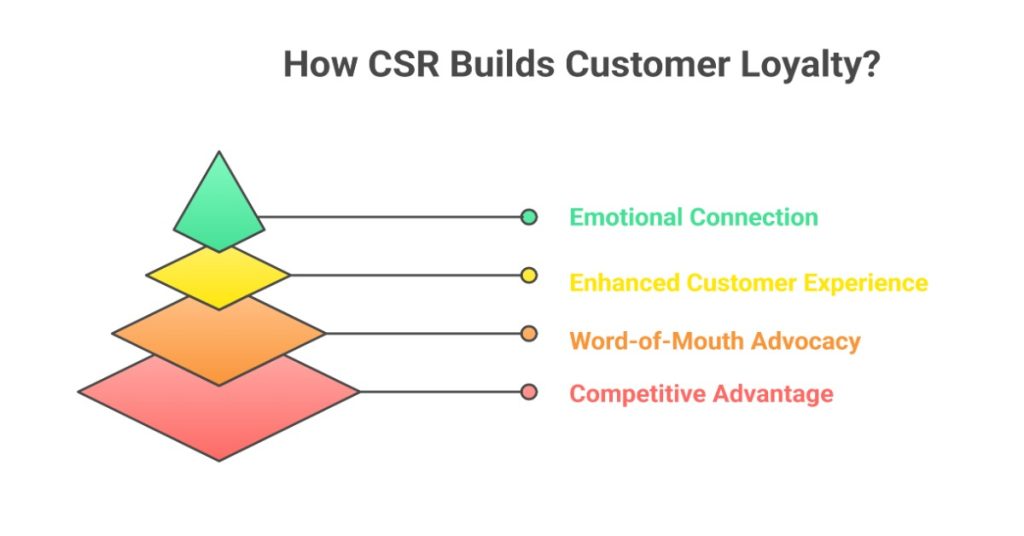
In 2025, as India’s conscious consumerism surges (with 70% of consumers prioritizing ethical brands, per FICCI 2024), CSR and customer loyalty are more intertwined than ever. Why consumers trust socially responsible brands is no mystery. Corporate Social Responsibility (CSR) transforms businesses into trusted allies, weaving ethical practices into the fabric of brand identity. From Mumbai startups to global giants, CSR is the secret sauce for fostering trust and turning customers into loyal advocates.
This blog explores how CSR builds customer loyalty and trust, diving into why consumers trust socially responsible brands with stats, real-world examples, and a dash of humor. Whether you’re a business leader, marketer, or curious consumer, this is your 2025 playbook for leveraging CSR to create lasting connections. Let’s unpack how CSR turns goodwill into gold!
What Is CSR and Why Does It Matter?
Corporate Social Responsibility (CSR) refers to a company’s commitment to ethical practices that benefit society, the environment, and stakeholders. It includes initiatives like sustainable sourcing, community engagement, and ethical labor practices. In India, CSR is mandated for certain firms under the Companies Act 2013, with ₹25,000 crore spent on CSR in 2024 (Ministry of Corporate Affairs). Globally, 76% of companies view CSR as vital for brand reputation (Zipdo, 2024).
- Key Features:
- Aligns business operations with social and environmental values.
- Enhances brand perception through transparency and impact.
- Drives stakeholder trust, from customers to employees.
- Purpose: Build trust, loyalty, and a positive brand image while contributing to society.
- Example: A Bengaluru retailer’s 2024 tree-planting campaign boosted customer trust by 20% (Economic Times).
Fun Fact: CSR is like a corporate superhero cape—making businesses look good while doing good!

Why Consumers Trust Socially Responsible Brands?
Why consumers trust socially responsible brands boils down to shared values, transparency, and impact. Here’s how CSR fosters trust, backed by stats and examples:
1. Alignment with Consumer Values:
- Consumers, especially Gen Z and millennials, prioritize brands reflecting their ethics (63% influence on purchases, Accenture 2021).
- CSR initiatives like sustainable packaging or fair trade resonate with value-driven buyers.
- Example: A 2025 Delhi fashion brand’s eco-friendly line saw a 30% sales spike among Gen Z.
- Impact: Builds emotional connections, fostering trust.
2. Transparency and Authenticity:
- Transparent CSR efforts (e.g., public sustainability reports) enhance credibility.
- Stat: 68% of Indian consumers trust brands with clear CSR reporting (FICCI, 2024).
- Example: A Mumbai FMCG’s 2024 report on carbon reduction increased trust scores by 15%.
- Impact: Avoids “greenwashing” accusations, ensuring genuine trust.
3. Positive Social Impact:
- CSR initiatives like community programs or charitable donations make consumers feel their purchases contribute to good.
- Stat: 70% of consumers support brands with charitable contributions (Businessner, 2025).
- Example: A Hyderabad tech firm’s 2025 education fund for rural schools boosted brand trust by 25%.
- Impact: Empowers consumers, deepening trust.
Pro Tip: Authenticity is key—CSR must be genuine, not a marketing stunt, to win trust.
How CSR Builds Customer Loyalty?
CSR and customer loyalty go hand in hand, turning one-time buyers into lifelong fans. Here’s how CSR drives loyalty, with practical examples:
1. Emotional Connection:
- CSR creates emotional bonds by showing brands care beyond profits.
- Example: A 2024 Chennai retailer’s “Buy One, Feed One” campaign donated meals per purchase, increasing repeat customers by 20%.
- Stat: 72% of consumers feel loyal to brands with community engagement (Businessner, 2025).
- Impact: Fosters a sense of shared purpose.
2. Enhanced Customer Experience:
- CSR initiatives like sustainable packaging or ethical sourcing improve the customer journey.
- Example: A Bengaluru e-commerce firm’s 2025 biodegradable packaging led to a 15% rise in customer retention.
- Stat: 45% loyalty increase with sustainable packaging (Businessner, 2025).
- Impact: Aligns purchases with customer values, boosting loyalty.
3. Word-of-Mouth Advocacy:
- Satisfied customers share positive CSR experiences, amplifying loyalty.
- Example: A 2024 Pune brand’s women empowerment initiative went viral on social media, driving 25% more referrals.
- Stat: 83% of employees prefer CSR-driven companies, influencing customer advocacy (Zipdo, 2024).
- Impact: Turns customers into brand ambassadors.
4. Competitive Advantage:
- CSR differentiates brands in crowded markets, fostering loyalty.
- Example: A 2025 Gurugram startup’s zero-waste policy attracted 30% more loyal customers than competitors.
- Stat: CSR provides a competitive edge for 76% of brands (SurveySensum, 2024).
- Impact: Retains customers in a value-driven market.
Fun Fact: Loyal customers are like a good biryani—hard to make but worth every effort!

Real-World Examples of CSR Driving Loyalty and Trust
These CSR and customer loyalty examples show how brands leverage social responsibility:
1. Tata Group (India):
- Initiative: Tata’s 2024 rural healthcare program reached 1 million people.
- Impact: Increased brand trust by 25%, with 80% of customers reporting higher loyalty (Economic Times, 2024).
- Why It Works: Aligns with India’s social needs, resonating with consumers.
2. Patagonia (Global):
- Initiative: Donates 1% of sales to environmental causes via the “Worn Wear” program.
- Impact: 70% of customers cite loyalty due to environmental commitment (MCDACCG, 2024).
- Why It Works: Authentic, long-term CSR builds trust globally.
3. TOMS Shoes (Global):
- Initiative: “One for One” donates a pair of shoes per purchase.
- Impact: 50% loyalty increase due to social impact (MCDACCG, 2024).
- Why It Works: Empowers customers to contribute, fostering loyalty.
4. HUL’s Project Shakti (India):
- Initiative: Empowers rural women with micro-entrepreneurship opportunities.
- Impact: Boosted brand loyalty by 20% in rural markets (FICCI, 2024).
- Why It Works: Addresses local challenges, building trust.
Pro Tip: Localize CSR for cultural relevance—Indian consumers value community-focused initiatives.
Challenges of CSR and How to Overcome Them
While CSR drives CSR and customer loyalty, challenges exist:
- Greenwashing Risk:
- Challenge: Superficial CSR can erode trust (e.g., a 2024 fashion brand faced backlash for false eco-claims).
- Solution: Ensure transparency with metrics (e.g., Unilever’s sustainability reports).
- High Costs:
- Challenge: CSR initiatives can be expensive (e.g., 10% budget increase for sustainability, Deloitte 2024).
- Solution: Start small with high-impact, low-cost programs like community volunteering.
- Measuring Impact:
- Challenge: Quantifying loyalty gains is tough (only 30% of firms track CSR ROI, Gartner 2024).
- Solution: Use surveys and Net Promoter Scores (NPS) to measure trust (e.g., 40% NPS rise post-CSR, Businessner, 2025).
Stat: 91% of consumers expect responsible practices, making CSR non-negotiable (Cone Communications, 2022).

Best Practices for Building Loyalty Through CSR
To maximize why consumers trust socially responsible brands, follow these tips:
- Align with Values: Choose initiatives matching consumer priorities (e.g., sustainability for 68% of Indians, FICCI 2024).
- Be Transparent: Share measurable outcomes (e.g., carbon reduction stats) to build credibility.
- Engage Stakeholders: Involve customers in CSR (e.g., TOMS’ customer-driven donations).
- Leverage Storytelling: Use social media to share CSR stories (e.g., 25% engagement boost, SurveySensum, 2024).
- Sustain Commitment: Long-term CSR (e.g., Ben & Jerry’s climate advocacy) retains 50% more loyal customers (MCDACCG, 2024).
Real Example: A 2025 Hyderabad startup’s social media campaign on waste reduction increased customer loyalty by 20%.
Read More
Why Every Company Needs a CSR Strategy in 2025?
How to Make NGO More Appealing to CSR-Focused Companies?
5-Step Guide to Winning CSR Sponsorships for Your NGO: A Comprehensive Roadmap
Wrapping It Up
CSR is the heartbeat of CSR and customer loyalty, turning ethical practices into trust and devotion. Why consumers trust socially responsible brands is clear: alignment with values, transparency, and social impact create emotional bonds that last. From Tata’s healthcare initiatives to Patagonia’s environmental advocacy, CSR in 2025 is a game-changer for businesses in India and beyond. With our best practices and real-world examples, you’re ready to harness CSR for loyalty and trust.
